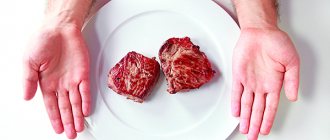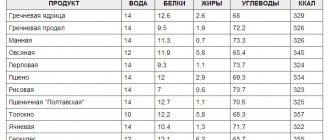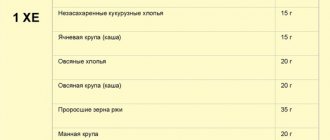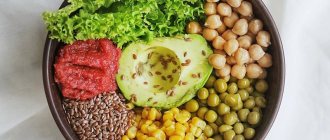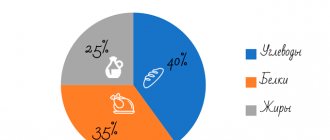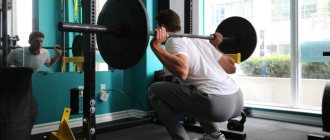In this article I want to shed light on this annoying question. And in short:
NO NEED TO COUNT CALORIES
Even if you want to lose weight, counting calories is not necessary. I've written about counting calories before.
, and the posts received an unprecedented response - from the indignant “How dare you trample on the immutable (?) postulates of nutrition?!” to the relieved “Finally! I’m so tired of always counting every piece.”
Yes Yes. If you, like the overwhelming majority of the female population, after the onset of the next New Year, begin to dream, “How can I lose weight?”
, then I propose to start this path with this post.
So why shouldn't you count calories?
First of all, because calories are different. Some of them are absorbed instantly, without requiring energy from the body (for example, from white rice, alcohol, sweets or white flour), while others require significant energy resources (for example, meat products and other foods high in protein, nuts and seeds, different sources of fat...)
Also, some foods, in principle, are not absorbed 100%, no matter how much energy you expend.
For example, nuts and seeds, of which approximately 30% end up in the toilet in their original, undigested form. And that's okay! That is, you do not need to rely on the energy of, for example, almonds, indicated in calories on the package. Feel free to subtract 30% from this figure, and then a little more - subtracting the energy that the body spends on digesting such complex food as nuts.
In addition, do not forget that the calorie content of all products in the tables was measured with a calorimeter: a kind of stove where the product - ATTENTION - is burned (!!) and then the heat that is released during its combustion is measured.
But let me! After all, we don’t have any stove inside! And your metabolism will have a huge impact on how the food you eat will be absorbed and... then burned, releasing energy. Do you notice the difference?
Therefore, I will not tire of repeating - calories are different, and simply counting everything and simply “eating less” does not help. Well, or it doesn’t help everyone. (I already wrote about this in more detail in the article “Fat Losers”
)
However, just to confuse you completely, it still doesn’t hurt to count calories sometimes (!).
Why? Didn’t she just write about how you don’t need to count calories?! - for sure, you thought.
Let me explain!
Although precise calorie counting is not necessary, how much and what you eat matters. If you go too far with the quantity of even the healthiest food in the world, you... will gain weight or, at a minimum, will not lose weight. For example, such healthy foods as avocados, nuts, seeds, fruits, dried fruits, berries, vegetable oils, vegetable milk are unusually high in calories. Yes, each of them has its own mechanism of action and they have different effects on satiety, but, nevertheless, I would advise you to monitor the quantity of these products if you have a goal to lose weight or at least not gain weight. And it is precisely their calorie content that I propose to roughly calculate by measuring their calorie content using tables - just so that you have an idea of whether you are overeating or not.
A simple example: plant milk (or regular milk) - calorie content is up to 50 kcal per 100 ml. A fashionable latte contains at least 300 ml of milk! Moreover, calories from regular and plant milk are precisely those that are absorbed instantly. Total, 1 latte = 150 practically useless calories! And 2 lattes are already 300 extra calories! Burn which you will need to run for as much as 30 minutes (if you weigh 65 kg, if you weigh less, then you will have to run longer)! 30 MINUTES OF RUNNING for 2 lattes?! Is it worth it?!
Or, for example, peanut or other nut butter: 1 teaspoon (!) contains as many as 95 calories! Or 10 minutes of jogging on rough terrain. Do you need it?!
Why physics is a super-precise science
Because physics! Law of energy conservation. It cannot come from nowhere and cannot go to nowhere. This is also true with regard to our issue of losing weight. We are dependent on energy from outside - these are calories from food. In the process of life, from lying on the couch in front of the TV to participating in an ultra-marathon, we spend this energy.
What follows is banal mathematics. If you ate 100 calories, but spent only 75 while lying on the couch, then the difference (15 calories) will be stored as a reserve in the form of fat deposits. If we do the opposite, we will force the body to compensate accordingly for the shortage by partially using up the “airbag”.
Photo: istockphoto.com
The irony is that we were designed in conditions of extremely irregular food supply, when every calorie was much more valuable than gold, so the chances of survival were higher for those individuals who learned how to store fat as much as possible at the moments when they managed to find food. So we are all actually descendants of “overweight” homo sapiens. And over millennia of evolution, the human body has masterfully learned to build up fatty tissue. And after we came up with the idea of combining combinations in one product that you cannot find in nature (lots of carbohydrates + lots of fats), the built-in fat accumulation mechanism began to go crazy with delight.
Healthy food can be high in calories
If an avocado had a nutrition label, you might be surprised to learn that it has 300 calories. But if you skip the avocado toast because of this, you'll be depriving yourself of folate, fiber, potassium, healthy fats and antioxidants. The same goes for many other healthy, but very high-calorie foods, such as walnuts, olive oil, and quinoa.
So, aside from counting calories, how do you choose wisely and wisely? First of all, you need to pay attention to the nutritional value of the product. Each calorie contains plenty of vitamins, minerals, protein and healthy fats. For example, 100 calories of sweet potatoes contain more vitamin A, C and fiber than 100 calories of wheat bread. If we only consider calories, we will miss the nutrients that are more important.
How to calculate all this?
“I can’t count - not only do you have to weigh everything, but you also have to know how much of what this carrot contains. And if it’s some kind of soup, then it’s not at all clear how to calculate everything!” Is this line of reasoning familiar? Don't panic! Yes, you really have to weigh your food. But 99% are exclusively at home, in a calm environment. Surely there are kitchen scales available, so adding one more movement - weighing - will not be difficult. In restaurants, canteens and other similar places, the weight of dishes is either indicated on the menu, or you can always check it with the waiter.
Photo: istockphoto.com
Weight loss stories: sugar is evil
As we know, we have “anti-sugar” marathons everywhere. We are fed stories that sugar is a sweet drug, that it causes addiction, obesity, heart attacks and all the troubles in life only from it. From a physiological point of view, it is quite stupid to listen to these fairy tales.
In fact, everything is a little different. If a person suffers from obesity, this is not the result of sugar, not glucose, but the result of his poor lifestyle in general. When the body consumes more energy than it can expend, it stores the remainder as fat.
And sugar is the same product as buckwheat porridge. It can be eaten, it does not affect metabolism, and in itself it is not to blame for anything. Another thing is that sugar is a useless but tasty thing that you want to eat a lot of. But here the questions are not for sugar, but for you.
Where to begin?
In practice, it makes sense to start with a coefficient of 1.3-1.4, gradually reducing calorie content by the same 10-15%. And under no circumstances do you condemn yourself to options where your daily calorie intake is equal to or even lower than your basal metabolic rate. This will sooner or later result in health problems. Better find out where your nearest gym is and increase your daily energy expenditure.
By the way, total calories are, of course, not everything. Although you can effectively lose weight by adhering only to this rule. I like to give the example of American blogger Anthony Howard-Crowe, who successfully lost weight online by eating whiskey and ice cream. However, if you are concerned not only with the numbers on the scales, but also with your general well-being, then later you will have to delve into how much protein, fat and carbohydrates you need to eat. And how can these ratios be manipulated? But first, just start counting calories. And lose weight.
Advantages of the method
This technique allows you to establish a healthy diet without stress for the body and abandon significant restrictions, due to which “breakdowns” most often occur. When you put your body on a strict diet, you create unbearable conditions for it. As a result, it begins to create additional fat reserves, and your weight increases.
Knowing how to correctly count calories and use this information in practice, you can create a complete, healthy diet. This method of losing weight brings benefits to the body, which cannot be said about hunger strikes and various mono-diets.
Your favorite foods will continue to remain on the menu, and you just need to maintain your calorie limits. In order not to go beyond the norm, you will begin to gradually give up eating harmful foods and replace them with healthier ones. At the same time, you can enjoy your favorite treat whenever you want.
Gradually you will learn to plan your diet and fill it with the right foods. You will begin to monitor your own nutrition and take a more thoughtful approach to purchasing groceries.
Constantly counting calories for weight loss will ensure that your body gets enough nutrients: fats, proteins and carbohydrates. Such weight loss will be safe and uniform, thanks to which the final result will exceed your expectations. By controlling your diet, you can avoid many negative aspects. For example, against the background of a lack of fat, problems with the hormonal system progress, and a deficiency of carbohydrates leads to a loss of strength and energy. Many diets are built on maintaining an excess of proteins, but this is also wrong, since it can give impetus to the development of kidney and gastrointestinal diseases.
Calorie-based meal planning
Calculation of daily calorie content for a moderately hypocaloric diet (formula adopted and approved by WHO)
1. Calculation of basal metabolic rate:
Women
18-30 years: 0.0621*real body weight in kg +2.0357
31-60 years: 0.0342*real body weight in kg +3.5377
over 60 years: 0.0491*real body weight in kg +2.4587
The result obtained is multiplied by 240 (conversion from mJ to kcal)
2. Calculation of total energy expenditure adjusted for physical activity:
Baud rate 1.1 is low
1.3 moderate
1.5 high
3. Calculation of the hypocaloric daily diet:
Subtract 500-600 kcal from the figure obtained in formula No. 2.
By counting calories, you take care of your own body. If, in addition to proper nutrition, you practice sports and maintain muscle mass, then your figure will become more toned. Proper nutrition prevents unwanted muscle loss. The result of losing weight will be more effective and lasting.
2-3 months of regular calorie counting are enough to adjust your eating habits and gain an understanding of what your ideal lunch should look like. Gradually, you will remember approximately what calorie content a particular product has, and you will make combinations without doing calculations on paper. All information will already be stored in memory.
Now “gluttonous days” will not be able to destroy your figure. To compensate for such a “breakdown”, you will only need to do an energy-intensive workout or reduce your calorie intake for a couple of days. Gradually, you will learn to maintain the achieved physical shape without grueling weight loss. Maintain a slight calorie deficit to stay in great shape.
Let's prepare a salad and count calories
In the warm season, people often prepare salads from fresh vegetables and herbs. With a little practice, you will quickly learn to determine the weight of a portion by eye. For preparation we will need: 300 g tomatoes, 300 g cucumbers, half a can of green peas, a bunch of greens 100 g and low-calorie mayonnaise.
Tomatoes: 3 x 23 = 69 kcal Cucumbers: 3 x 14 = 42 kcal Greens: 1 x 30 = 30 kcal
A jar of peas is 400 g, which means half a jar is 200 g. A packet of mayonnaise is 500 g, let’s see what part we used. Everyone has their own taste, so the amount of mayonnaise will vary. Let's say that we took ¼ part, which means 125 g of mayonnaise. In order to count quickly, it is better to round up - 130 g.
Peas: 2 x 40 = 80 kcal Mayonnaise 1.3 x 250 = 325 kcal Total: 546 kcal
It turns out that 1 kg 30 g of the salad we prepared will give our body 546 kcal. But a person will not eat the whole salad at once, so divide the resulting dish visually, for example into 5 parts. It turns out 200 g of salad per serving. Also divide the calories by 5. It turns out that the serving of salad that you put on your plate contains about 110 kcal. Thus, we count everything we eat.
The most popular calorie counting apps
Today there are many applications that allow you to control the menu, weight loss, nutrition, weight, and many other factors of your successful transformation. The most popular of them are My FitnessPal, FatSecret, YAZIO, HiKi Calorie Calculator, Lifesum, Dine4Fit, and many others.
Remember something important for yourself: we count everything that goes into our mouth! Any seed, crumb, any sip. To really lose weight, first of all, you will have to wean yourself from “hamstering.” Otherwise, no diet will help.
The basis of any weight loss is a calorie deficit. And this system really works. Another thing is how serious this deficiency will be and how hard it will “hit” your body.
Now let’s talk a little about fitness horror stories, or why we break diets and get fat.
Choose carefully: it’s easier to gain weight
That is, we love to accumulate fat and know how to do it, but “burning” it is difficult and only if there is force majeure. So, any diet is an imitation of such force majeure. We “cut” the supply of energy (calories), forcing the body to little by little “eat up” its reserves. Accordingly, the speed of this process depends primarily on the size of this delta. Other factors against this background are so insignificant that they can be completely neglected.
Therefore, the choice of a specific “diet” is unimportant. If only it created an energy deficit. True, it is worth considering that the more crazy the menu (for example, kefir with cucumbers), the faster the body will exhaust its vitamin and mineral reserves. In the worst case scenario, it is fatal. You should still choose a diet based on common sense and logic. Another important criterion is personal preference. Since losing weight is, in any case, a process that takes several weeks, you need to choose an option that will be most convenient for you personally to adhere to. For example, many girls, whose usual diet practically does not include meat dishes, will have a difficult time on a high-protein diet at first (until the enzymatic system is rebuilt). For others, the keto diet, which emphasizes eating fatty foods (yes, you can successfully lose weight on fats!), will be poorly tolerated.
So if you really need a diet, be careful with your choice. And keep in mind that “eat as much as you like” will not work. You can lose weight on any diet. Or gain weight. It all depends on the quantity, so...
How much does it weigh in grams?
If you decide to try the method of calculating calories, then even in the process of mastering the program you will have a question - how much do you need to eat to lose weight? The first (and most correct) way is to find out your weight, then write down all your food for a week. Then add up all the calories and divide by seven (according to the number of days). This way you will determine your average daily calorie intake. If during this period your body weight has not changed, then this indicator can be taken as a starting point. And for starters, reduce your caloric intake by literally 10-15%. For those who are very pressed for time and need to start losing weight yesterday, there is a plan “B”. Using the Mifflin-Geor formula (Google to help), you determine your basic energy expenditure, how much your body spends to provide for itself in a state of complete rest. Then multiply the resulting value by the physical activity coefficient corresponding to you: 1.2-1.3 - inactive, mostly sedentary lifestyle; 1.4-1.6 - moderate activity, two or three workouts per week; 1.8+ - very active lifestyle, 3-4 or more workouts per week.
Photo: istockphoto.com
Weight loss stories: you can’t eat at night
Different people have different biological rhythms. Some people are actively awake from 6 a.m., while others drink their third cup of coffee at 12 p.m. to wake up.
Do you recognize yourself or your surroundings? So, there are people who absolutely cannot live without breakfast, and there are people who definitely need to eat before bed. What to do in the second case? And what about breakfast - the most important meal of the day?
You will be surprised, but there will be no weight gain from carbohydrates at night if you invest in your calorie
.
At night, the body sleeps, but the lungs breathe, blood circulates, and the stomach digests food.
Everything works, nothing stagnates or wanders anywhere. Another thing is to reduce the load on the body and not take away quality sleep, try to have dinner 2-3 hours before bedtime.
The most important law of dietetics
The most important law of dietetics: the law of energy balance - the correct balance between calorie intake and expenditure . The energy value of the diet (calorie content) should be equal to the body’s energy expenditure; if you consume more calories than you expend, they will begin to be deposited in the form of fat reserves and excess weight; if less, then you will begin to lose weight.
So, there is a concept: basal metabolism is the minimum amount of calories that your body spends every day, even while at rest, that is, when it lies down and does not move. This waste is needed for the functioning of the heart, lungs, brain, to maintain body temperature, and so on. What exactly your basal metabolic rate will be depends on your gender, height, age and weight. On average, for women it is approximately 1300-1500 kcal, and for men - 1500-2000 kcal.
An example for understanding: for example, we received when calculating that at rest your body spends 1500 kcal, and during normal physical activity (you go to work, perhaps do sports, household chores, and so on) - and so with such habitual In your lifestyle, your body no longer spends 1500, but more – for example, 2000 kcal! Then how do you know how many calories you need to eat to lose weight? If we calculate that you spend 2000 kcal, that is, you need 20 percent less - that is, approximately 1600 kcal.
Subscribe to our INSTAGRAM account!
Most importantly, the difference between calorie expenditure and consumption should not be more than 20-30%, then we really create conditions in the body for fat burning and muscle gain, and do not put the body into a state of hunger or stress. For example, if with an energy expenditure of 2000 kcal a person receives 1000 kcal from food (50% difference), he, of course, can lose weight, but most likely at the expense of water and muscles. The body experiences a very large calorie deficit, “starves”, and tries to store fat as a strategic reserve of energy. At the same time, there remains a very high probability of breakdowns, hormonal disruptions and even more weight gain.
We haven't come up with a better idea yet: useful free apps
And then the magic of the 21st century begins. Take out your smartphone, open any calorie counter (the most popular today are FatSecret
and
MyFitnessPa
l, differ from each other approximately like a BMW and a Mercedes: both cope with the task with a bang) and by pressing a couple of buttons you find the desired dish, indicate the number of grams and that’s all. The program will immediately calculate calories, proteins, carbohydrates and fats. And it will even write down how much and what else you need (well, okay, you can) eat today.
For those who are familiar with their smartphone, mastering calorie counters will take about 10 minutes. If you have any difficulties, you can always enter the corresponding query into the YouTube search bar and watch a training video. Then the lion's share of questions will disappear by themselves. The rest will come with experience. Based on practice, the path to mastering MyFitnessPal from scratch to the “master” level takes 2-3 days, after which the terrible and terrible calorie counting takes five to ten minutes a day. As for me, it’s a reasonable price to pay for the opportunity to diversify a boring diet menu at any time with a donut or a pie with custard.
Is physical activity important for calorie counting when losing weight?
Physical activity when losing weight by counting calories is important, but not required. That is, if you want to lose weight, start counting calories, and at the same time go to the gym or pool - of course, your weight will drop much faster.
But don’t forget about everyday activity - the number of steps taken per day, energy spent on cooking, calculating the daily life expectancy (yes, this also requires energy), etc. The main thing is that one activity does not become a detriment to another, no less important, everyday activity.
Want to know how to lose weight in 7 days? Read our article.



